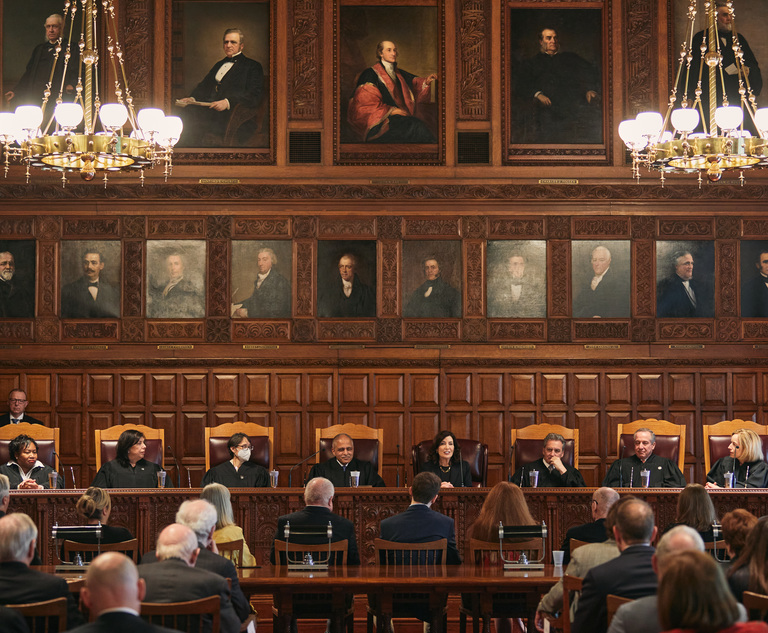
January 23, 2024 | New York Law Journal
Court Expands 'Monroe' Test for Zoning ImmunityA discussion of the Second Department's expansion of the 'Monroe' balancing test for zoning immunity on private projects that serve a public interest.
By John C. Armentano
7 minute read

January 23, 2024 | New York Law Journal
New York Court of Appeals Reinforces Attorney-Client Privilege PrinciplesA recent New York Court of Appeals decision clarified the scope of the attorney-client privilege under New York law.
By Lauren E. Aguiar, Anna E. Drootin, and Julianna Ricigliano
6 minute read

January 22, 2024 | New York Law Journal
Geopolitical Risks Force Us to Fastrack AI in Financial Crime ComplianceThe pace of change combined with the unpredictability of updates from major regulators has increased pressure on legal and compliance professionals to keep pace.
By Michael Heller
5 minute read

January 19, 2024 | New York Law Journal
Attorneys 'On the Move': Morrison Foerster Adds Finance Partner; Securities Litigator Joins Moses SingerAnd other announcements of recent hirings and promotions of New York attorneys.
By Patricia Kane
5 minute read

January 19, 2024 | New York Law Journal
Battling Bias In Workplace Predictive A.I.: Challenges for Employers and the BarThe use of AI in employment is truly a new frontier. AI reflects the world from which it learns and those who create it. Employers cannot rely on AI tools alone for employee recruitment and management. Proactively mitigating algorithmic bias is not only warranted but, in some forward-thinking jurisdictions, mandatory.
By Richard Reice
8 minute read

January 18, 2024 | New York Law Journal
New York State Legislation Limiting Withholding of Retainage on Private Construction Projects: What Does It Mean for Your Contracts?On Nov. 17, 2023, Governor Kathy Hochul signed legislation amending New York's General Business Law Sections 756-a and 756-c, known as the Prompt Payment Act, to limit the withholding of retainage on private improvement construction projects. As a result of these amendments, close attention must be paid to contract terms and conditions during contract preparation, review or negotiation.
By Robert J. Fryman
5 minute read

January 17, 2024 | New York Law Journal
How COVID Redefined PR and Branding CampaignsOver the last three and a half years, rapid changes to how customers interact and how businesses promote themselves have been paramount. COVID changed it all. Yes, there were—and are—other societal factors in play, but what may become known as "the COVID era" upended the entire PR and branding landscape.
By Ioana Good
6 minute read

January 17, 2024 | New York Law Journal
Is RPAPL §1301 Really an Impediment to Pursuing a Guaranty Claim?Scott Weinberg and Joel Haims discuss New York's "Election of Remedies" statute, examining whether it really has a material impact in practice.
By Scott A. Weinberg and Joel C. Haims
6 minute read

January 16, 2024 | New York Law Journal
Implied Covenant of Good Faith and Fair Dealing in Public Construction Projects: This Week in Scott Mollen's Realty Law DigestScott Mollen discusses "SCE Environmental Group v. Murnane Bldg. Contrs. Inc." involving three litigations arising from a public construction project commenced by the NYS Office of General Services.
By Patricia Kane
14 minute read

January 16, 2024 | New York Law Journal
Borrower's Common Defenses in Mortgage Foreclosures NegatedHoward Kingsley, who represented Broom Lender in "Broome Lender LLC v. Empire Broome LLC," discusses the case and how the Appellate Division, First Department removed common obstacles and cleared the path for assignees of mortgage loans to foreclose easily and quickly. Kingsley offers that the case is a "major win for lenders and their assignees because there had not been a prior decision by a New York state court where it found that, although standing was not established through an allonge, standing was established on summary judgment by the assignment of the note."
By Howard W. Kingsley
8 minute read
Trending Stories
- 111 Red State AGs Demand Damages in Antitrust Lawsuit Shaming ESG Climate Investors
- 2In-House Moves of Month: Discover Fills Awkward CLO Opening, Allegion GC Lasts Just 3 Months
- 3Delaware Court Holds Stance on Musk's $55.8B Pay Rescission, Awards Shareholder Counsel $345M
- 4'Go 12 Rounds' or Settle: Rear-End Collision Leads to $2.25M Presuit Settlement
- 52 Federal Judges Rescind Senior Status After Trump Win. Might More Follow?
More from ALM
- Legal Speak at General Counsel Conference East 2024: Match Group's Katie Dugan & Herrick's Carol Goodman 1 minute read
- Legal Speak at General Counsel Conference East 2024: Eric Wall, Executive VP, Syllo 1 minute read
- Legal Speak at General Counsel Conference East 2024: Virginia Griffith, Director of Business Development at OutsideGC 1 minute read



